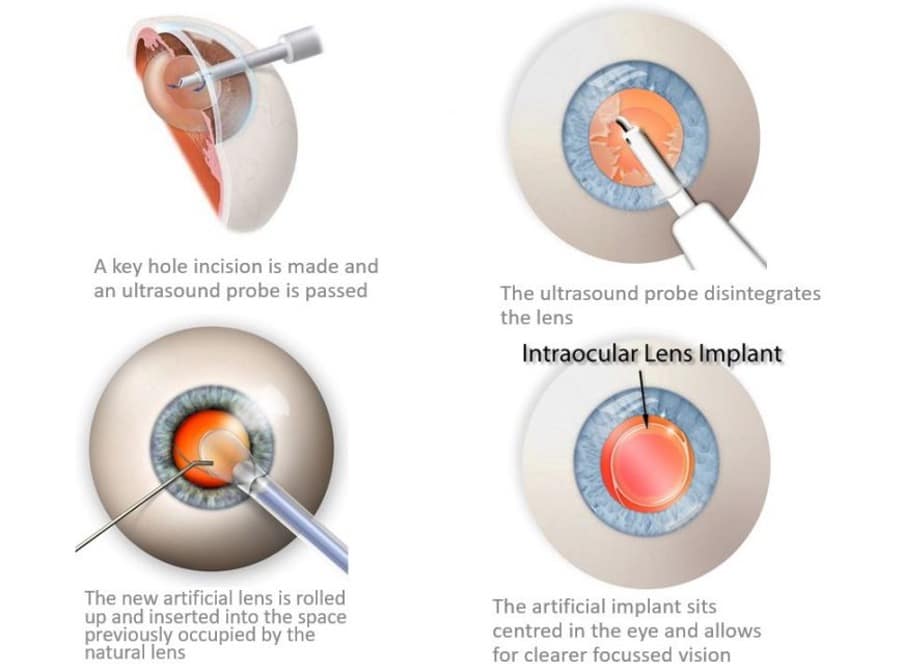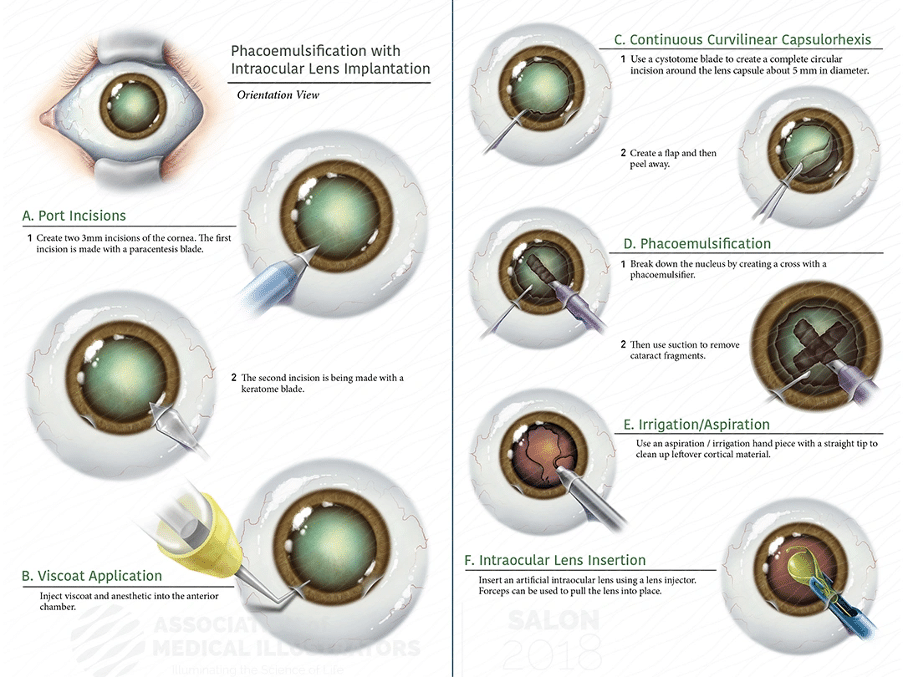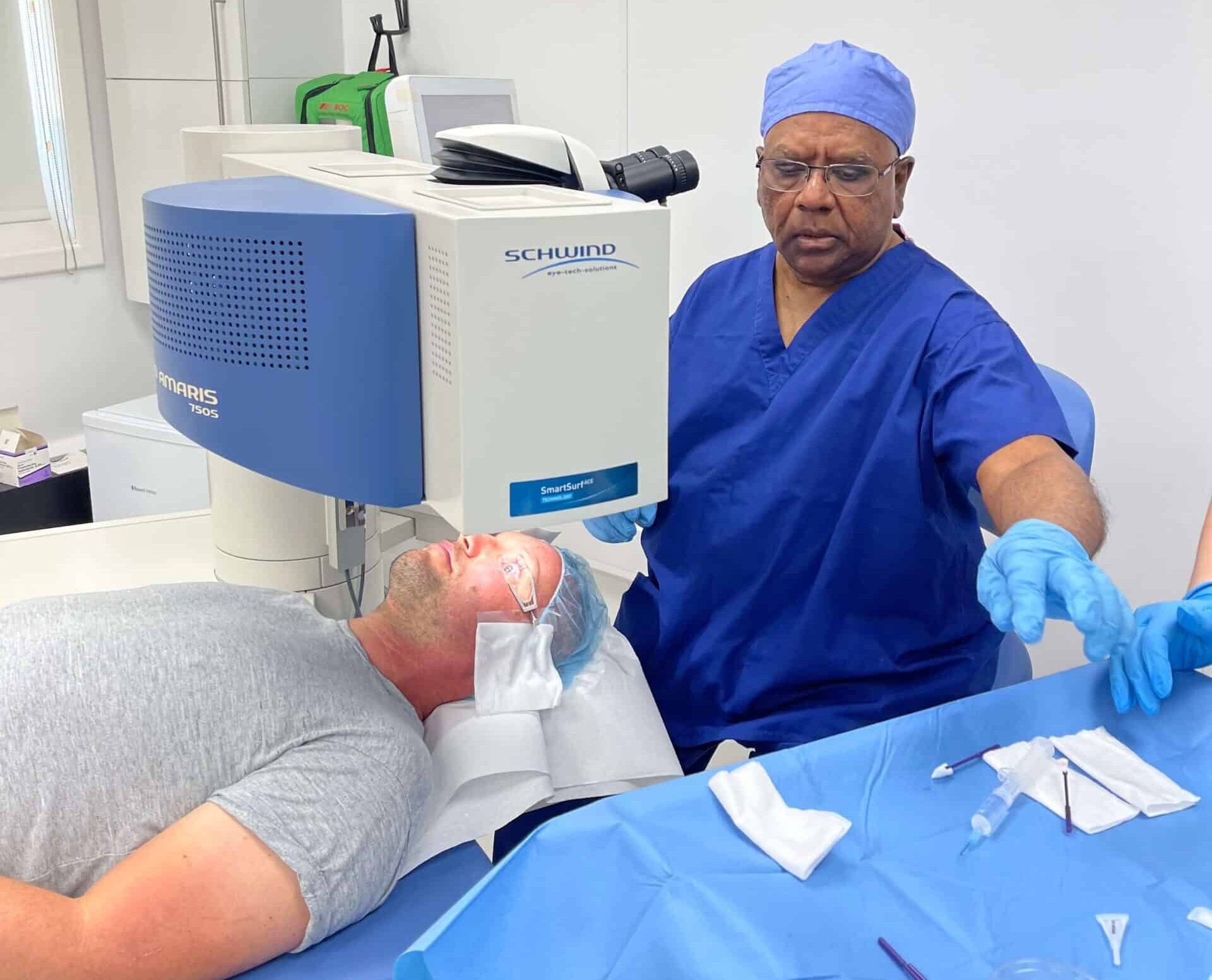Lens replacement surgery stands among the safest operations doctors perform today. Each year, this procedure helps transform the vision of more than 3 million people in Europe. The surgery not only fixes your vision but also comes with a bonus many people don’t know about – you’ll never get cataracts.
The procedure works differently than laser eye surgery. Your surgeon replaces your eye’s natural lens with an artificial one, which means you won’t face lens clouding as you age. The Royal College of Ophthalmologists reports that 95% of patients love their results and call the experience life-changing. This knowledge about the procedure will help you decide if it’s right for you, especially if you struggle with age-related vision problems or want a lasting solution.

What is lens replacement surgery and how does it work?
Lens replacement surgery removes your natural eye lens and puts in an artificial intraocular lens (IOL). This powerful procedure has two main goals—it treats cataracts and fixes refractive errors that cause vision problems.
Replacing the natural lens with an artificial one
Your natural eye lens sits behind your pupil and focuses light onto your retina so you can see clearly. Age can make this lens cloudy (cataracts) or less effective at providing clear vision at different distances. Your surgeon takes out the natural lens and puts in an IOL—a clear artificial lens made from acrylic or silicone material. These artificial lenses last a lifetime and become part of your eye. You won’t see or feel the lens once it’s in place. Today’s IOLs come in several types that match different vision needs:
- Monofocal lenses – Focus at one distance (typically far vision)
- Multifocal lenses – Provide vision at multiple distances (near, intermediate, and far)
- Toric lenses – Correct astigmatism among other vision issues
- Extended depth of focus (EDOF) – Provide improved focus range with fewer visual disturbances
Your lifestyle, visual needs, and eye health determine the best lens choice. Your consultant will give you personalised advice based on these factors.

How does eye lens replacement work?
The procedure takes 15-30 minutes for each eye and happens as day surgery. Your surgeon uses anaesthetic eye drops to numb your eye completely, so you won’t feel any pain during the operation. Your surgeon makes a tiny cut in your cornea (the clear front surface of your eye). This small opening lets them reach your natural lens. The cut heals by itself without needing stitches.
Patients who need both eyes done usually have their surgeries about a week apart. This gives the first eye time to start healing before the second surgery. Lens replacement surgery has amazing results—95% of patients can see well enough to drive or better after the procedure. This operation ranks as one of medicine’s safest, with over 3 million surgeries done yearly in Europe alone.
How does cataract lens replacement work?
Cataract lens replacement uses phacoemulsification—the standard method for modern cataract surgery. Here’s what happens:
- Your surgeon reaches the cloudy lens through a small corneal cut
- An ultrasound probe breaks down your cloudy lens into tiny pieces
- A fine tube suctions out these pieces
- Your surgeon places your new artificial lens in the empty lens capsule
This minimally invasive process keeps the lens capsule (the thin membrane that held your natural lens) intact to support the new artificial lens. Your vision improves gradually after surgery, and typically stabilises within 2-4 weeks. Most patients don’t need glasses after surgery, though about 5% might need them for certain activities. In spite of that, clear vision and never getting cataracts again make lens replacement a great choice for the right candidates.
Why cataracts never return after lens replacement
Lens replacement surgery gives you a remarkable benefit – you’ll never get cataracts again after the procedure. Did you know lens replacement surgery eliminates the risk of cataracts for life? Many patients find this permanent solution valuable as they think over their vision correction options.

Understanding the clouding of the natural lens with age
Your eye’s natural lens gets cloudy as you age. Young people have crystal clear lenses that let light pass through easily. Around age 40, proteins in your eye’s natural lens start to break down and cluster together. These clusters create cloudy spots on the lens that we call cataracts.
These protein clusters grow bigger over time and affect more of your lens. Your vision becomes blurry because these clouds scatter and block light before it reaches your retina. You might notice blurred vision, problems with glare, and colours that look less vibrant. This doesn’t happen overnight. The process takes months or even years. You might first notice small changes in your vision, like trouble reading or driving after dark. Without treatment, cataracts can make it hard to see clearly.
Why artificial lenses don’t develop cataracts
The science behind why cataracts can’t return after lens replacement surgery is simple. Cataracts only form on your natural lens. Your surgeon takes out this natural lens and puts in an artificial intraocular lens (IOL) during the surgery. These IOLs use materials like acrylic or silicone that can’t develop protein clusters that cause cataracts. The artificial lens stays clear because it doesn’t have the same proteins as your natural lens.
About one-third of people who get lens replacement might experience what doctors call a “secondary cataract”. This name doesn’t tell the whole story. The real condition – posterior capsular opacification (PCO) – isn’t actually a cataract. PCO happens when cells left after surgery grow on the lens capsule’s back surface and create a thin film that affects vision. The good news? A quick, painless laser procedure fixes this in minutes with no recovery time needed.
The long-term benefit of lens replacement
Permanent protection from cataracts stands out as one of the biggest benefits of lens replacement surgery. Unlike laser vision correction that reshapes your cornea, lens replacement gives you a lifetime solution by removing the part where cataracts form. This advantage means a lot to patients in their 50s and 60s. They won’t need cataract surgery later in life. This is a big deal as it means that over 330,000 cataract surgeries happen each year in England alone.
Research shows patients love their results after lens replacement:
- 88% say their life got better after surgery
- 87% got the freedom from glasses they wanted
- 85% love their distance vision without glasses
Our expert surgeons at Precision Vision London use advanced technology to see if lens replacement works for you. We’ll walk you through how everything works and what benefits you can expect, including never worrying about cataracts again.
Who is a good candidate for lens replacement?
Do you find yourself holding books at arm’s length to read? This could mean you have presbyopia—a condition that makes you a great candidate for lens replacement surgery. The procedure can give you clear vision at multiple distances and might eliminate your need for reading glasses or bifocals completely.

Age-related vision changes and presbyopia
Presbyopia affects virtually everyone over 40. Your eye’s natural lens becomes stiffer and less flexible with age. Reading messages on your phone or looking at your computer screen becomes harder. You might catch yourself holding things farther away just to see them clearly. Your eye’s crystalline lens loses its flexibility over time. This makes focusing on close objects like books or smartphone screens increasingly difficult. By age 50, presbyopia reaches its full development. This makes it the perfect time to consider lens replacement surgery.
When laser eye surgery isn’t suitable
Laser eye surgery works well for many people, but lens replacement might be your better option for several reasons:
- Thin or irregular corneas: Laser procedures need enough corneal thickness to reshape safely. Lens replacement offers a great alternative if your corneas are too thin.
- Age considerations: People over 40 get the best results from lens replacement, especially after age 50. The benefits clearly outweigh any risks at this stage when presbyopia has fully developed.
- Early lens changes: Subtle lens changes start affecting vision quality in many patients over 50, even before cataracts become obvious. Lens replacement tackles these issues early.
At Precision Vision London, we use advanced lens technology to restore clarity now and protect your future vision.
High prescriptions and other vision issues
Lens replacement really stands out for people whose prescriptions fall outside laser surgery’s safe range. Prescriptions stronger than -8.00 dioptres for myopia or +6.00 dioptres for hyperopia often rule out corneal-based procedures. The good news? Lens replacement can fix almost any level of refractive error. We can calculate the artificial intraocular lens (IOL) precisely to give you optimal vision correction, whatever your original prescription strength.
Lens replacement effectively fixes multiple vision problems at once:
- Presbyopia: Fixes age-related focusing problems
- Astigmatism: Special toric IOLs help people with irregularly shaped corneas
- Hyperopia and myopia: Even severe cases see improvement
Patients over 50 with thin or irregular corneas that rule out laser eye surgery will find lens replacement a detailed solution. The procedure not only corrects existing vision problems but also prevents future cataracts something laser surgery can’t do.
What to expect during and after the procedure
Patients often ask about comfort and recovery before they opt for lens replacement surgery. Our experts at Precision Vision London make sure you stay comfortable from the moment you walk in until you leave.

Is the surgery painful?
You can relax knowing that lens replacement surgery causes virtually no pain. We completely numb your eye with anaesthetic drops before the procedure. On top of that, it helps to give you mild sedation so you stay relaxed throughout. Many patients say this procedure feels more comfortable than a visit to the dentist. You might feel a slight heaviness or gritty sensation as the anaesthetic wears off, but these mild effects don’t last long.
How long does the procedure take?
Lens replacement surgery takes just 15 to 30 minutes per eye. You’ll spend about 3-4 hours at our clinic on surgery day. This gives us time to prepare you properly and lets you rest briefly afterward to start your recovery right.
Recovery timeline and aftercare
Your vision may stay blurry for 24-48 hours after surgery while your pupil remains dilated. Patients notice substantial improvements in their vision within days, and most see remarkable changes by their one-week checkup.
We support your healing with:
- Antibiotic eye drops to prevent infection
- Anti-inflammatory drops to reduce swelling
- Detailed aftercare instructions
When can you return to daily activities?
Most patients head back to work after three days, unless their job involves dusty or smoky environments – these should be avoided for about two weeks. Someone needs to drive you home after the procedure since you can’t drive right away. Full healing takes up to eight weeks, but you can resume most daily activities much sooner. Stay away from swimming for 4-6 weeks.
Why choose Precision Vision London for your lens replacement
Experience makes all the difference in choosing your eye surgeon. Precision Vision London stands as the inaugural clinic in the UK with state-of-the-art technology that sets new standards in precision eye care.
Expert surgeons with years of experience
World-renowned ophthalmologist Dr. CT Pillai leads the surgical team with over 30 years of specialist experience. The team has performed more than 50,000 successful laser procedures. Dr. Pillai’s expertise is unmatched with both corneal and refractive fellowships—a rare combination that gives a complete knowledge of lens replacement procedures.
Advanced diagnostic and surgical technology
Precision Vision uses state-of-the-art technology to achieve optimal results. Their AI-powered diagnostic tools measure your eye’s unique characteristics to the micron level. Surgeons use this detailed analysis to select and position the ideal intraocular lens that matches your specific needs.
Personalised care and patient-first approach
A complete 2-hour consultation starts your treatment with full testing by experienced refractive optometrists. Precision Vision gives patients something special—care continuity where the same surgeon guides them from the original assessment through their final check-up.
Trusted reputation and high patient satisfaction
Patient satisfaction at the clinic reaches exceptional levels, with 96.5% of patients recommending lens replacement to friends and family. This trust shows their steadfast dedication to outstanding outcomes.
Book your consultation today to tap into the freedom from glasses and cataracts forever.
Conclusion
Lens replacement surgery changes lives in two amazing ways. Most patients want this procedure to fix their vision, but it gives them something even better – permanent protection from cataracts. Your new artificial intraocular lens means you’ll never develop cataracts.
Living without glasses and not worrying about future cataracts gives patients incredible peace of mind. The procedure is safe and causes minimal discomfort. Recovery happens fast. Patients go back to their normal routine within days. Their vision improves dramatically and gets better over several weeks. Your specific needs depend on your age, prescription strength, and vision challenges. This solution works great for people over 50 who have presbyopia. It’s also perfect if laser correction isn’t right for you because of corneal issues or high prescriptions.
Precision Vision London will help you through each step of this life-changing trip. Our world-class surgeons have decades of specialist experience. We use innovative AI-powered diagnostics to give you truly personalised care. That’s why 96.5% of our patients tell their loved ones to get this procedure. You’ll need cataract surgery one day – that’s a fact. So why wait until your vision gets worse? Lens replacement at Precision Vision London gives you clear vision now and protects your future eye health. Book your detailed consultation today and learn how this amazing procedure can reshape your vision for life.
Key Takeaways
Lens replacement surgery offers life-changing vision correction whilst permanently eliminating the risk of future cataracts—a hidden benefit many patients don’t initially realise.
- Cataracts can never return after lens replacement because artificial lenses don’t contain the proteins that cause clouding with age
- The procedure takes just 15-30 minutes per eye and is virtually painless, with most patients returning to work within three days
- Ideal candidates are typically over 50 with presbyopia, high prescriptions, or those unsuitable for laser surgery due to thin corneas
- 95% of patients achieve driving-standard vision or better, with 96.5% recommending the procedure to friends and family
- Recovery is remarkably quick with significant vision improvement within days, though full healing takes up to eight weeks
The procedure essentially provides two treatments in one—immediate vision correction and lifelong protection against cataracts. Unlike laser surgery which only reshapes the cornea, lens replacement addresses the root cause of age-related vision changes by replacing the natural lens entirely.
FAQs
Q1. What are the main advantages of lens replacement surgery? Lens replacement surgery offers two significant benefits: it corrects vision problems and permanently eliminates the risk of developing cataracts in the future. The procedure replaces your eye’s natural lens with an artificial one that cannot cloud over time.
Q2. How long does lens replacement surgery take and is it painful? The surgery typically takes 15-30 minutes per eye and is virtually painless. Your eye will be numbed with anaesthetic drops, and you may receive mild sedation. Most patients report minimal discomfort during and after the procedure.
Q3. Who is an ideal candidate for lens replacement surgery? Ideal candidates are usually over 50 years old, experiencing presbyopia (age-related difficulty focusing on close objects), have high prescriptions, or are unsuitable for laser eye surgery due to thin corneas. The procedure is particularly beneficial for those wanting to address multiple vision issues simultaneously.
Q4. How quickly can I return to normal activities after lens replacement? Most patients can return to work within three days of the surgery, unless their job involves dusty or smoky environments. Vision typically improves significantly within the first few days, with substantial improvement noticeable by the one-week follow-up appointment. However, full healing takes up to eight weeks.
Q5. What is the success rate of lens replacement surgery? Lens replacement surgery has a high success rate, with approximately 95% of patients achieving vision of driving standard or better following the procedure. Additionally, about 96.5% of patients recommend the surgery to friends and family, indicating high levels of satisfaction with the results.
Authors & Reviewer
-
 Olivia: Author
Olivia: AuthorHi, I'm Olivia, a passionate writer specialising in eye care, vision health, and the latest advancements in optometry. I strive to craft informative and engaging articles that help readers make informed decisions about their eye health. With a keen eye for detail and a commitment to delivering accurate, research-backed content, I aim to educate and inspire through every piece I write.

